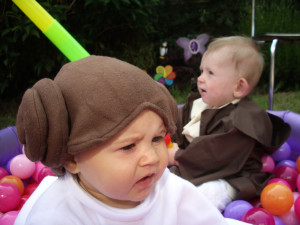
Image by AntToeKnee. Check out his profile to read his hilarious bio.
When you sit down to write, who are you writing for? Are you writing only for your own amusement (or catharsis?), or to entertain other people? And which is right?
If you write only to please yourself, you’re in danger of contracting Ugly Baby Syndrome—thinking your creation is perfect no matter what anyone else says. If they don’t like it, you are personally offended. If they say pages full of poetic scenic description are boring, you say they are uncultured swine. You throw a little pity party because nobody understands your unique method of expression.
Well, you’re right. Nobody understands you because you’re not explaining yourself well.
Here’s the tough truth: being unique doesn’t make you good. You may be expressing yourself, but you are refusing to express yourself in a language anyone else understands. You are being selfish. If you want to be understood, you have to speak to them in their language first. Start where you have common ground. That means putting the story—its integrity, pace, and structure—above your pretty-words ego.
If you write only to please people, well, you’ll become a people-pleaser. A sellout.The irony is that this is another form of selfishness. You’re really writing for the attention, the prestige, the money. As soon as you find something most people seem to like, you’ll just keep writing that same story over and over again—change the names and the settings, but the same plot every time. You don’t dare to be different. You don’t dare to write the truth about your own life and struggles and the hard things you’ve learned. You turn into a formula fiction factory. On your new book cover, your name is larger than the title because people already know what’s in any story you write. You’ve stopped being an artist. You have ceased to express yourself. You are not telling the world anything it doesn’t already know.
So what’s the answer?
Write for yourself. Edit for your audience.
Maggie pointed this out in the comments of this post.
When you pour out that first and second draft, write what you enjoy. Write the kind of story you love to read. Write who you are in the grittiest, nakedest way. Write what you want to say to the world.
The ironic result is that a lot of other people probably love what you love. A lot of them have felt what you have felt. What you write could appeal to them on a deep level.
When you move on into the rewriting and editing stages, have them first in mind. You expressed yourself. Now, translate that expression. Help your audience understand you, and help them have a good time of it. Put the story above your ego. That means showing truth, not preaching it. It means cutting out extraneous drabble; letting go of your sentimental attachments if they don’t support the story. If you are in love with an unnecessary character, or you adore a setting that hinders the plot, or you’re attached to a line of dialogue a character would never say, cut it out!
Your writing ability should serve the story, not the other way around. First the truth-telling. Then the truth-translating.
That’s how to create something both you and your audience will love.
—
What sentimental attachments do you have to detrimental elements of your work? What truths are you afraid might offend people?
—






